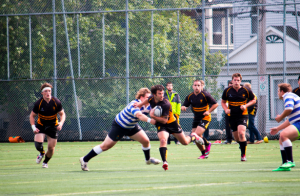
Subordinating is too vague, creating ambiguity in Dal’s Hazing Policy
Hazing means any activity expected of a student wishing to join a group (or of a student wishing to gain or maintain full status in a group) which humiliates, degrades, abuses, endangers, or subordinates that student, regardless of his or her apparent willingness to engage in the activity.
That’s Dalhousie Athletics’ policy on hazing – pretty simple and straightforward.
For the record, I am a former hockey player at Dal and Gazette sports editor, and agree wholeheartedly with the spirit of the university policy. I believe it is a progressive response to a problem that has been long overlooked in sports.
It’s in the details where I’m slightly confused. I do not support any form of abuse or bullying, be it physical, verbal, or sexual humiliation and degradation. I’m with the policy through these points. It’s the next word where I feel a line in the sand needs to be drawn over what is considered hazing. “Subordinates” throws too wide a blanket over a more nuanced and specific problem.
Under the current wording of the policy I don’t have any problem with some things that could be construed as hazing by the university, and think it could be inadvertently applied to other areas if enforced vehemently.
Let me throw a hypothetical at you. Let’s say one of Dal’s sports teams, whether it’s club or varsity, decides to have a rookie party. This team builder starts at dinner. The entire team shares a meal and drinks (for those of legal age) together off campus with everyone picking up their own tab.
So far so good, right?
After the meal, the team moves to a veteran player’s house where the rookies perform skits and sing songs they have written for the rest of the team. There will be alcohol at the party, because after all, it’s university, but no one will be forced to imbibe. The rookies perform their skits one at a time in front of the team, joining the crowd of longer tenured players seated to watch when their turn is up. Cheering and jeering comes from the players in response to the actions performed.
Is this hazing? I’m not sure.
There does not seem to be abuse or endangerment. There may be mild humiliation, and there is subordination, so, by the policy put forth, it certainly seems to be. Again, this is only hypothetical and we do not know the exact occurrences at the Dal rugby party. It could have been much worse, but since neither the players nor coaches will discuss things further, how can we know for sure?
By the policy put forth, I could call unpaid internships and apprenticeships hazing. I could say teaching assistants and associate professors have been hazed. Don’t they get stuck with the majority of menial tasks of academia, subordinating themselves in order to “gain or maintain full status in a group”? This is a ridiculous argument, I concede, but under the current phrasing of the policy, replace the term “student” and there could be a case made.
In attempting to cover all the bases, Dal has constructed a policy that could conceivably be used in an unfair or absurd premise. I understand the need to take a strong stance on a prominent issue. Real incidents of hazing are not to be tolerated because of the potential damage. I’m not defending Dal’s men’s rugby or women’s hockey programs either. The incidents that led to their punishment were in bad taste to say the least. I’m just worried about what can come from an overzealous policy bent on seeing abuse in subordination.
Sports teams often have rookie tasks that can be viewed in the same way that an apprentice craftsman learns his trade. It’s part of earning your spot in the locker room and on the team. Rookies are often responsible for cleaning and packing the bus for road trips. They fill water bottles and are the last to get tape and equipment. It is a condition that rookies generally don’t enjoy, but is done with the knowledge that everyone before you had endured the same treatment, and those that come after will as well. It allowed rookies to get to know the team’s equipment managers and their assistants. Eventually, it is an unnoticed annoyance; a favor done for the people who have more time in. And from my experience in sports, it subtly happens on all sports teams.
Again, is this hazing? It surely is subordination, but I fail to see anything to condemn in these actions.
We have to be careful when reacting to a situation like the one facing our university. Hazing is the type of action that inspires knee jerk reactions. It is imperative to be cool-headed and think through the type of policy put forward to curb such behavior, lest it end up with a different application than is originally intended.
I don’t condone hazing. I condemn the actions of any team that breaks the other conditions of the Dal hazing policy – which seems to be the case in the two incidents of infamy the past two years at Dal. I don’t want to see a policy put in place that overreaches in its zeal to put a stop to a rightfully lime-lighted wrong. Let’s move the line in the sand back a bit and pull the last clause of the Dalhousie Hazing policy.







